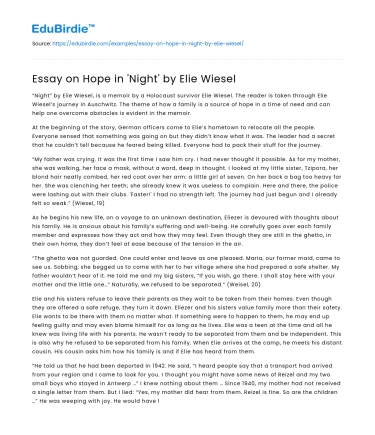“Night” by Elie Wiesel, is a memoir by a Holocaust survivor Elie Wiesel. The reader is taken through Elie Wiesel’s journey in Auschwitz. The theme of how a family is a source of hope in a time of need and can help one overcome obstacles is evident in the memoir.
At the beginning of the story, German officers come to Elie’s hometown to relocate all the people. Everyone sensed that something was going on but they didn’t know what it was. The leader had a secret that he couldn’t tell because he feared being killed. Everyone had to pack their stuff for the journey.
Save your time!
We can take care of your essay
- Proper editing and formatting
- Free revision, title page, and bibliography
- Flexible prices and money-back guarantee
“My father was crying. It was the first time I saw him cry. I had never thought it possible. As for my mother, she was walking, her face a mask, without a word, deep in thought. I looked at my little sister, Tzipora, her blond hair neatly combed, her red coat over her arm: a little girl of seven. On her back a bag too heavy for her. She was clenching her teeth; she already knew it was useless to complain. Here and there, the police were lashing out with their clubs. 'Faster!' I had no strength left. The journey had just begun and I already felt so weak.” (Wiesel, 19)
As he begins his new life, on a voyage to an unknown destination, Eliezer is devoured with thoughts about his family. He is anxious about his family’s suffering and well-being. He carefully goes over each family member and expresses how they act and how they may feel. Even though they are still in the ghetto, in their own home, they don’t feel at ease because of the tension in the air.
“The ghetto was not guarded. One could enter and leave as one pleased. Maria, our former maid, came to see us. Sobbing, she begged us to come with her to her village where she had prepared a safe shelter. My father wouldn’t hear of it. He told me and my big sisters, “If you wish, go there. I shall stay here with your mother and the little one…” Naturally, we refused to be separated.” (Weisel, 20)
Elie and his sisters refuse to leave their parents as they wait to be taken from their homes. Even though they are offered a safe refuge, they turn it down. Eliezer and his sisters value family more than their safety. Elie wants to be there with them no matter what. If something were to happen to them, he may end up feeling guilty and may even blame himself for as long as he lives. Elie was a teen at the time and all he knew was living life with his parents. He wasn’t ready to be separated from them and be independent. This is also why he refused to be separated from his family. When Elie arrives at the camp, he meets his distant cousin. His cousin asks him how his family is and if Elie has heard from them.
“He told us that he had been deported in 1942. He said, “I heard people say that a transport had arrived from your region and I came to look for you. I thought you might have some news of Reizel and my two small boys who stayed in Antwerp …” I knew nothing about them … Since 1940, my mother had not received a single letter from them. But I lied: “Yes, my mother did hear from them. Reizel is fine. So are the children …” He was weeping with joy. He would have liked to stay longer, to learn more details, to soak up the good news, but an SS was heading in our direction and he had to go, telling us that he would come back the next day” (Weisel, 43-44)
When families are separated, members live for the good news of their relatives. Eliezer decides it is better to lie and give his distant cousin a reason to go on living. Also, Eliezer and his father try to convince themselves that their loved ones are alive as well. This gives each party hope and a reason to keep on living. No one wants to hear bad news about their family. At times, people cannot handle the pain and give up on life.
Elsie Wiesel develops the theme of how a family is a source of hope in a time of need and can help one overcome obstacles. The theme allows readers to visit the idea of family and what they are there for. This theme changes readers' views on family. As the reader is taken through Elie’s experience, they discover a whole new field where a family is important.






 Stuck on your essay?
Stuck on your essay?

